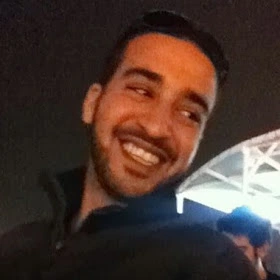Dr. Fouad Gehad Marei
fouad.marei@uni-erfurt.deJunior Fellow (Max-Weber-Kolleg für kultur- und sozialwissenschaftliche Studien)
Sprechzeiten
nach Vereinbarung
Besucheranschrift
Max-Weber-Kolleg für kultur- und sozialwissenschaftliche Studien
Campus
Nordhäuser Str. 63
99089 Erfurt
Postanschrift
Universität Erfurt
Max-Weber-Kolleg für kultur- und sozialwissenschaftliche Studien
Postfach 90 02 21
99105 Erfurt

Zur Person
Curriculum Vitae
Fouad Gehad Marei is a Research Associate at the Department of Theology and Religion, University of Birmingham and Associate Research Fellow at the Max Weber Center for Advanced Cultural and Social Studies, University of Erfurt. His research focuses on Muslim religiosities, piety, Shii politics, Islamic eschatology, sectarianism and jihadism as well as on state-society relations, and governance. He has research experience in Lebanon, Syria and Iraq and is particularly interested in conflict and post-conflict dynamics. As a member of the ERC-funded AlterUmma project, Fouad's ongoing research examines Shii ritual practices and cultures in the Middle East and the diaspora.
Fouad has previously worked at the Free University of Berlin and the Orient Institute in Beirut, Lebanon. He has also consulted governmental and nongovernmental stakeholders on regional politics and has been involved in developing and implementing conflict stabilisation and transformation programmes. Fouad holds a PhD from Durham University.
E-mail: f.g.marei@bham.ac.uk / fouad.marei@uni-erfurt.de
URL: LinkedIn | ResearchGate | Academia | Orcid
Forschungsprojekt
As Associate Research Fellow at the Max-Weber-Kolleg, Fouad’s research project, Rendering the Imam: VR Technologies and Muslim Encounters with the Sacred, examines the processes of creating and curating religious experience through virtual reality and other multi-sensorial and immersive multimedia technologies. He interrogates the affordances and limitations of these technologies and investigates their impact on worship and devotion, asking how they broaden a believer’s ‘field of view’ and transform her/his imaginal engagements with the metaphysical and the religious Elsewhere. By situating digital sensory-aesthetic forms of devotion within the broader landscape of Shi‘i traditions and ritual practices, he demonstrates the continuities and ruptures that the adoption of such technologies entail.
In addition, Fouad is organizing the online workshop, Rewiring the House of God: Religious Self-World Relations in the Digital Environment (iFaith), a joint collaboration between the University of Birmingham and the University of Erfurt. Inspired by trends in research on digital religion, mediatization of religion, and religion on the internet, the iFaith workshop examines the mutually transformative relationship between digital technologies and contemporary modes of religiosity and religious self-world relations, with a particular focus on three broad themes:
1. Religious subjectivities and digital technologies, which examines the role of new media and digital devices in processes of religious subjectivation;
2. Communities of faith in an era of digital culture, which investigates the impact of digital media on processual constructions of imagined communities of faith and the political and socio-religious life of the religious community; and
3. The occult and otherworldly in the digital environment, which calls into question the relationship between digital technologies and imaginal engagements with the religious Elsewhere and the other-worldly.
Publikationen (Auswahl)
- Marei, Fouad G., Yafa Shanneik, and Christian Funke (eds.) (forthcoming), Beyond Karbala: New Approaches to Shi‘i Materiality.
- Dewachi, Omar, Fouad G. Marei, and Jonathan Whittall (2021). “Contested Statehood: The Politics of Health Care in Syria”. In: Everybody’s War: The Politics of Aid in the Syrian Crisis, ed. by M. Hofman, J. Whittall and J. Bseiso. New York: Oxford University Press (in print).
- Marei, Fouad G. and Yafa Shanneik. 2021. “Lamenting Karbala in Europe: Husayni Liturgy and Discourses of Dissent amongst Diasporic Bahraini and Lebanese Shi‘is”, Journal of Islam and Christian-Muslim Relations, 32 (1), 53–79. https://doi.org/10.1080/09596410.2020.1827341.
- Marei, Fouad G. 2020. “Governing Dahiya: Interrogating the State in Beirut’s Southern Suburbs”, Journal of Leadership and Developing Societies, 5 (1), 12–36. https://doi.org/10.47697/lds.34348002.
- Marei, Fouad G. 2020. “From the Throes of Anguished Mourning: Shi‘i Ritual Lamentation and the Pious Publics of Lebanon”, Religion and Society, 11 (1), 133–147. https://doi.org/10.3167/arrs.2020.110110.
- Marei, Fouad G. 2020. “Dahiya Doctrine”; “Islamic State (Daesh)”; “Hayat Tahrir al-Sham”; “Sectarianism”; and “Syrian Local Coordination Committees”. In: Conflict in the Modern Middle East: An Encyclopaedia of Civil War, Revolutions and Regime Change, ed. by Jonathan K. Zartman. Santa Barbara, CA: ABC-CLIO.
- Marei, Fouad G., et al. 2018. “Interventions on the Politics of Governing the “Ungovernable””, Political Geography, 67, 176–186. http://doi.org/10.1016/j.polgeo.2018.01.003.
Policy papers and other publications
- Marei, Fouad G. 2019. Are Municipalities in Lebanon Delivering? Survey Results on Solid Waste Management, Public Safety and Government Transparency. Berlin: Democracy Reporting International. July 2019. [in EN and AR]
- Dewachi, Omar and Fouad G. Marei. 2018. “Background Paper on Health and Conflict in Syria”, Lancet Commission Report: Syria—Global Health in Conflict.

